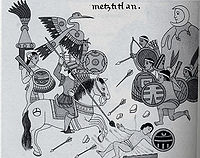
Photo from wikipedia
Through our scholarly representations, as well as our teaching, anthropologists illustrate how our common human heritage includes a rich variety of social and cultural practices as well as other culturally… Click to show full abstract
Through our scholarly representations, as well as our teaching, anthropologists illustrate how our common human heritage includes a rich variety of social and cultural practices as well as other culturally relative markers of our diverse humankind. Through our research, some anthropologists endeavor to combat ethnocentrism, or to illuminate and better understand the effects of racism and other systems and structures of inequality, and through engaged anthropology, others seek to transform such systems and structures. Besides describing human diversity past and present, anthropologists increasingly illustrate the historical processes by which particular notions of “the familiar” and “the strange” are constructed, reproduced, and maintained in society. One of anthropology’s primordial goals is thus to challenge ideas that certain populations and their customs are “strange” by demonstrating in part how one’s own culture is historical and contingent, only one among many possible variations, and as such can appear “strange” to others. We join other scholars whose work is informed by social constructivism and an emphasis on ontological dimensions of making meaning about the world (Anderson 1991; Pina-Cabral 2017). We are also attentive to the ways in which power is illustrated in hegemonic discourses about the familiar and the strange, especially in heritage and tourism encounters. Of course, anthropologists are not alone in disseminating and deconstructing representations associated with “strangeness” and “familiarity.” While they may make the familiar appear strange or the strange familiar as a strategy to unsettle common assumptions about the way we imagine the world to be, other social actors also transpose familiarity and strangeness for a range of goals and interests, generating different and more-or-less intended effects.
Journal Title: Journal of Anthropological Research
Year Published: 2018
Link to full text (if available)
Share on Social Media: Sign Up to like & get
recommendations!